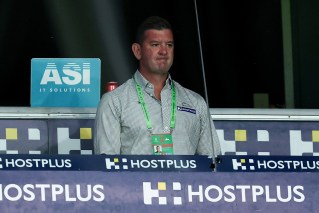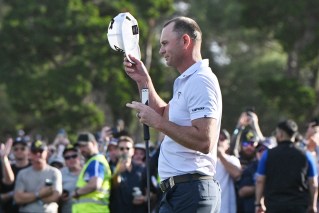Off the field and into bed: Concussion also damages sexual performance


A blow to the head can result in a more general wilting of the body, notably in the sex organs. Photo: Getty
One in four former footballers recovering from a concussion also report suffering erectile dysfunction, possibly due to injury to the pituitary gland.
This is the conclusion of a US study that also found up to one in five former players reported low testosterone levels.
The study – involving self-reporting by 3409 retired NFL players – has established a strong association between concussion and compromised sexual performance, rather than a causal relationship.
More concussions, more wedding tackle troubles
However, participants in the study reporting the highest number of concussion symptoms were about twice as likely to report low testosterone compared to those with the fewest symptoms
The association was similar for erectile dysfunction in analyses that accounted for demographic, current health and football-related factors including position played.

The pituitary gland is the size of a pea but controls many of the body’s vital functions, including sex hormones. Photo: Getty
The conclusions were supported by the fact that erectile problems and low testosterone were found even among those players reporting relatively few concussion symptoms when they were injured.
The Harvard School of Public Health researchers advise that previous studies have suggested head trauma in men may be associated with low testosterone levels and sexual dysfunction, possibly because of trauma-induced damage to the pituitary gland.
This perhaps understates the growing body of evidence that has investigated the vulnerability of the pituitary gland in a head injury: The size of a pea, situated at the base of your brain, behind your nose and between your ears, it’s also known as the “master gland” and influences nearly every part of your body, including the production of sex hormones.
Pituitary gland under increasing scrutiny
In a 2014 article in Endocrine News about pituitary incidents in traumatic head injuries, Johns Hopkins University neuroendocrinologist Gary Wand observed that, in a traumatic head injury, as seen in athletes and veterans: “It turns out that the two systems that are most vulnerable to injury are the production of growth hormone and the production of sex hormones.”
(Dr Wand was careful to clarify that growth hormone is not only a hormone for children to reach adult height; adults require growth hormone to maintain lean body mass, bone mass, bone strength, and bone density.)
In 2016, the British Medical Journal published a major review, The screening and management of pituitary dysfunction following traumatic brain injury in adults.
Study based on self-reported data
In the Harvard study, former football players were surveyed about experiencing “concussion symptoms while playing or practising professional football and, if they had, how many times.”
In addition, they were asked if a health care provider had ever recommended or prescribed medication for low testosterone or erectile dysfunction and if they were currently taking medication for those conditions.
Of the players, more than 18 per cent had indicators for low testosterone levels and 23 per cent had indicators of erectile dysfunction.
The study has a number of limitations, including indirect measures of low testosterone levels and erectile dysfunction, and concussion data that were collected after a player’s career ended and that relied on memory recall.
Also, it isn’t known whether the men had low testosterone levels or erectile dysfunction before they started playing in the NFL.
The study authors suggest their findings might encourage clinicians to ask men with brain injuries about the treatable conditions of low testosterone levels and erectile dysfunction.








